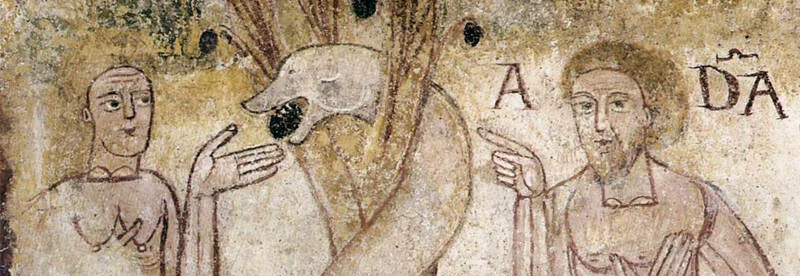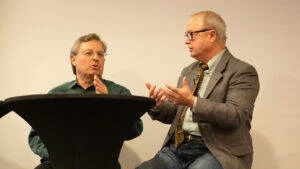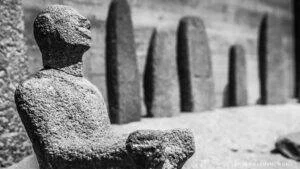Before we look at the most vocal and serious revisionist account of Pauline theology, it will be helpful to get our bearings by providing a sketch of the so-called traditional interpretation of Paul.
Douglas Moo provides one of the clearest, most nuanced, and exegetically rigorous accounts of this take on Paul’s theology. Paul’s theology, on this account, can be succinctly summarized as moving “from plight to solution.” There is for Moo a prospective movement in Paul’s thinking that proceeds forward from Paul’s establishment of what is wrong with the human situation to a corresponding response from God that solves humanity’s problem.
Romans & The Plight of Humanity
Humanity’s plight is most clearly articulated by Paul, according to Moo, in Romans 1:18–3:20, a text that functions as “a preparation for, rather than as part of, Paul’s exposition of the gospel of God’s righteousness.”[1] It is obvious, then, that on this construal God’s saving solution must correspond to this plight. Salvation and justification, then, are understood in light of the prior plight of humanity.[2] Again, Moo: “But it [i.e., Rom. 1:18–3:20] is a necessary preparation if what Paul wants to emphasize about this righteousness is to be accepted by the Romans.”[3] In other words, before the Roman church can fully accept Paul’s teaching on righteousness, they must first be convinced of their plight and hence their need for justification.
Humanity’s plight is due to the “imprison- ing effect of sin” that holds sway over all people and thereby prevents all people from doing what God demands of them.
As I mentioned in my introductory post, this construal of Paul’s theology has significant ramifications for evangelism and proclamation. Moo clearly recognizes this, and, in a pastoral aside, states that unless one first understands “the awful reality of the wrath of God” and the desperate situation of human inability to please God, then one cannot “come to grips with the importance of the gospel, or be motivated as we should be to proclaim it” (p. 98). Moo’s treatment of Rom. 1:18–3:20 is a clear and articulate example of the common Protestant penchant for beginning with sin, human inability, and divine wrath before moving to what God has done for us in the gospel.
So what is the plight? In short, for Moo, humanity’s plight is due to the “imprisoning effect of sin” that holds sway over all people and thereby prevents all people from doing what God demands of them.[4] Humanity’s bondage to sin and inability to do what God requires results in a situation that elicits God’s wrath against humanity. Thus, Romans 1:18–3:20 is a universal indictment against humanity and 1:18 is the heading that indicates that everyone stands condemned under God’s wrath.[5] This long stretch of text, then, concludes in 3:20 by denying that humanity can be made right with God through doing the law. Again, in Moo’s words: “The law presents people with the demand of God. In our constant failure to attain the goal of that demand, we recognize ourselves to be sinners and justly condemned for our failures.”[6] Doing the law cannot make us right with God, since we simply don’t have the capacity to do what it says! The purpose of the law, then, is simply to show us our plight, to reveal how sinful we are, and how desperate our condition is so that we will be ready to embrace God’s gracious solution.
How does Paul establish that all of humanity is culpable before God and stands condemned under God’s wrath? Paul provides two responses—one that corresponds to those without God’s law and one for those who have the law. For those who do not have the law, Moo points to Romans 1:19–21 where people are portrayed as having clear access to God’s attributes and yet turn away from God and commit idolatry. For Moo, “natural revelation leads not to salvation but to the demonstration that God’s condemnation is just: people are ‘without excuse’.”[7] All people have access to divine revelation through creation, and yet this knowledge about God functions simply to indict humanity of its guilt for refusing to worship God. This is linked to humanity’s sinfulness—since humanity is imprisoned by sin, they are “unable to respond appropriately to whatever knowledge of God they may possess. Paul, then, teaches a natural revelation, but, at least in this passage, the purpose and effect of that revelation are wholly negative.”[8] But if humanity is entirely incapacitated by sin and unable to do what God demands, then what sense does it make to see God as setting up a situation where his existence can be discerned from rational speculation upon the cosmos, only to have this result in humanity’s failure and resultant condemnation?
Those who have access to the Law of Moses are not advantaged, however, since humans are entirely unable to do what that Law requires. Paul opposes this Law not only because Christ has initiated a new era in salvation-history but even more fundamentally because the Law holds forth righteousness and life only for those who do the Law. “The problem with human doing is that it is always and necessarily inadequate: sinful humans are incapable of rendering to God the obedience that God deserves.”[9] And the Law demands that the entirety of it be obeyed for justification (Gal. 5:3).
Works of the Law and Works in General
Notice that Moo self-consciously moves from the situation that Paul addressed where he opposed works related to observance of the Torah to the theological abstraction of “the universal issues of works’.”[10] What is the justification for Moo’s moving from “works of the law” to “works” in general?
‘Works of the law’ are inadequate not because they are ‘works of the law’ but, ultimately, because they are ‘works’.
First, in Galatians, the apostle employs the language of “doing” the law to criticize Torah observance, and the emphasis here is more upon the act of doing than about the law itself (Gal. 3:10, 12; 5:3). Paul is deeply committed to the belief that humans are simply morally unable to do what the law says. In short, Paul has a deeply pessimistic anthropology. And Moo suggests that numerous portions of Paul’s letters bear this point out. For example, Romans 7 is clear that “the Jew is in despair because of being unable to ‘do’ the good law of God that God gave Israel.”[11] One sees in Moo the traditional antithesis between doing/working and believing. That is, humanity is morally incapable of doing what God demands, so God graciously makes a simpler and easier demand to simply believe upon Christ. In Romans and Galatians, Moo finds Paul criticizing the . . .
. . . Jews for thinking that the Mosaic covenant is adequate without that perfection in ‘works’ without which any system of law must fail to bring one into relationship with God. The Jews become, as it were, representative of human beings generally. If the Jews, with the best law that one could have, could not find salvation through it, then any system of works is revealed as unable to conquer the power of sin. The ‘bottom line’ in Paul’s argument, then, is his conviction that sin creates for every person a situation of utterly helpless bondage. ‘Works of the law’ are inadequate not because they are ‘works of the law’ but, ultimately, because they are ‘works’.[12]
There must, then, be a better way for humans to be made right with God. Thus, the law is in its nature “a matter of ‘doing’ (not of ‘believing’; see 3:12); and human doing, or ‘works, can never be the basis for entering into or sustaining a relationship with God.”[13] This antithesis between doing and believing as well as the depiction of the working Jew as representative of humanity’s plight has, however, become controversial and, I think it is fair to say, quite unfashionable due to its unfair depiction of Judaism as a legalistic and merit-based religion. Apart from any empirical investigation of their actual beliefs, this view often sees Judaism functioning as a cipher for the necessary preparatory stage for the preaching of the gospel. We will see that many recent re-readings of Paul have found this aspect of the traditional interpretation highly problematic.
Having explored Moo’s take on humanity’s plight as set forth in Paul, we are prepared now to examine how Paul moves to God’s gracious provision of humanity’s salvation—a salvation that, for Moo and most traditional interpreters of Paul, is deeply connected to justification by faith alone.
[1] Douglas J. Moo, The Epistle to the Romans (NICNT; Grand Rapids: Eerdmans, 1996), 92.
[2] See also D. A. Carson, who writes on Rom. 1:18—3:20: “Disputants are unlikely to agree on the solution to a problem if they cannot agree on the nature of the problem.” See Carson, “Atonement in Romans 3:21–26: ‘God Presented Him as a Propitiation’,” in The Glory of the Atonement: Biblical, Historical, and Practical Perspectives: Essays in Honor of Roger P. Nicole (eds. Charles E. Hill and Frank A. James III; Downers Grove, IL: InterVarsity Press, 2004), 119–39, here, 119.
[3] Moo, The Epistle to the Romans, 92.
[4] Moo, The Epistle to the Romans, 92.
[5] Moo, The Epistle to the Romans, 97.
[6] Moo, The Epistle to the Romans, 210.
[7] Moo, The Epistle to the Romans, 106; cf. p. 123.
[8] Moo, The Epistle to the Romans, 123–24.
[9] Douglas J. Moo, Galatians (BECNT; Grand Rapids: Eerdmans, 2013), 27.
[10] Moo, Galatians, 27.
[11] Moo, Galatians, 29.
[12] Moo, The Epistle to the Romans, 217.
[13] Moo, Galatians, 35.








Comments
Be the first one to make a comment!